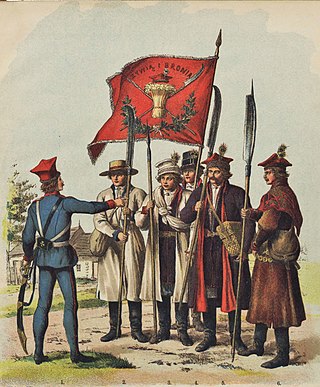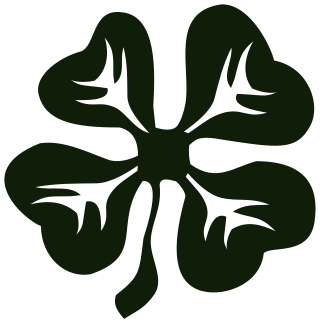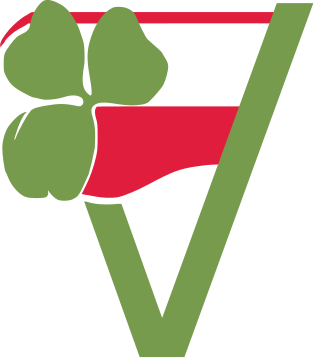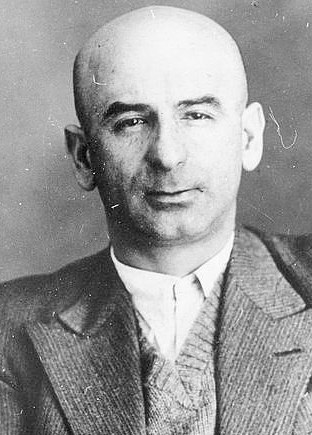The Polish People's Party is an agrarian political party in Poland. It is currently led by Władysław Kosiniak-Kamysz.

The Kraków uprising of 1846 was an attempt, led by Polish insurgents such as Jan Tyssowski and Edward Dembowski, to incite a fight for national independence. The uprising was centered on the city of Kraków, the capital of a small state of Free City of Krakow. It was directed at the powers that partitioned Poland, in particular the nearby Austrian Empire. The uprising lasted about nine days and ended with an Austrian victory.

Cyryl Ratajski was a Polish politician and lawyer.

The Christianization of Poland refers to the introduction and subsequent spread of Christianity in Poland. The impetus to the process was the Baptism of Poland, the personal baptism of Mieszko I, the first ruler of the future Polish state, and much of his court. The ceremony took place on Holy Saturday, 14 April 966, although the exact location is disputed by historians, with the cities of Poznań and Gniezno being the most likely sites. Mieszko's wife, Dobrawa of Bohemia, is often seen as a major influence on Mieszko's decision to accept Christianity.

The Polish Liquidation Committee of Galicia and Cieszyn Silesia was a temporary Polish government body that operated in Galicia at the end of World War I. Created on 28 October 1918, with its seat in Kraków, the Committee was headed by Wincenty Witos and Ignacy Daszyński. The Committee aimed primarily to maintain order in the territories of the former Austrian part of partitioned Poland during the re-establishment of an independent Poland.

Scythemen, also known as scythe-bearers is the term for soldiers armed with war scythes. First appearing in the Kościuszko Uprising of 1794, scythemen quickly became one of the symbols of the struggle for Polish independence and for the emancipation of the serfs.

The pagan reaction in Poland was a series of events in the Kingdom of Poland in the 1030s that culminated in a popular uprising or rebellion, or possibly a series of these, that destabilized the Kingdom of Poland.

Związek Ludowo-Narodowy was a Polish political party aligned with the National Democracy political movement during the Second Polish Republic, gathering together right-wing politicians with conservative and nationalist opinions.
Polish People's Party "Piast" or Polish Peasant Party "Piast" was a political party from the interwar period of the Second Polish Republic (1913–1931). Piast refers to the medieval Piast dynasty, Poland's founding royal house.

Jerzy Jan Lerski ; was a Polish lawyer, soldier, historian, political scientist and politician. After World War II he emigrated to the United States, where he became a full professor at the University of San Francisco.

Polish Socialist Party – Left, also known as the Young Faction, was one of two factions into which Polish Socialist Party divided itself in 1906 at its ninth congress. Its primary goal was transform Poland into a socialist country, established through proletarian revolution, and likely a member of some international communist country.

Czesław Wycech (1899–1977) was a Polish activist, politician and historian. He was a member of the Polish peasant's parties: the Polish People's Party "Wyzwolenie", the People's Party, the Polish People's Party, and the United People's Party. During World War II he was a member of the Polish Underground State, responsible for organizing underground education. He was the Minister of Education in the Council of National Unity (1945–1947). Within the People's Republic of Poland, he was a member of the Polish parliament (Sejm) and also held other governmental posts.

Jan Piekałkiewicz was a Polish economist and statistician, politician and the Polish Underground State's Government Delegate.

The Polish People's Party existed in post-World War II Poland from 1945 to 1949. In a period of increasing solidification of communist power in Poland but with the political system retaining some formal adherence to multiparty democracy principles, the PSL was a broadly left-wing non-communist party that was not allied with the communists. The PSL was defeated by the communist-based bloc in the rigged legislative elections of 1947.

The Christianization of Bohemia refers to the spread of the Christian religion in the lands of medieval Bohemia. As in many other countries, Christianity was related to the establishment of a new state, and was implemented from the top down.

Polish People's Party Nowe Wyzwolenie also known as the Polish Peasant Party Nowe Wyzwolenie was a political party founded in Warsaw on 9 June 1946 in Poland soon after the defeat of Germany in World War II. PSL "Nowe Wyzwolenie" formed a few months before the USSR took political control over the country, and was a Polish Worker's Party (PPR) inspired split from the Polish People's Party (PSL) opposed to the Deputy prime minister Stanisław Mikołajczyk.

The Greater Poland Civil War refers to the conflict that took place during 1382–1385 in the Greater Poland province of the Kingdom of Poland during the interregnum period following the transition of power between the Piast dynasty, Angevin dynasty and the Jagiellon dynasty.

The Polish People's Party – Peasants' Agreement, commonly known simply as Peasants' Agreement (PL), was an agrarian and Christian-democratic political party in Poland.

Saul Amsterdam, also known as Gustaw Henrykowski, was a Polish communist activist, a lawyer by profession. Initially, a member of the Poale Zion 1918–1921, and from 1923, a member of the Central Committee of the Communist Party of Poland (KPP). Between 1933 and 1934 Amsterdam was a member of the Politburo of the Central Committee of the KPP. He also was a journalist and involved in the activities of the Communist International.


















